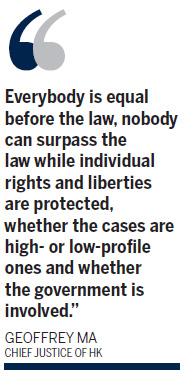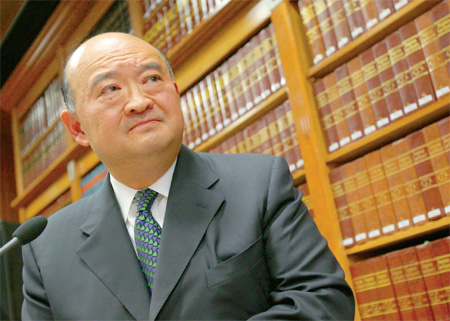New Chief Justice pledges to uphold rule of law
Updated: 2010-09-09 07:46
By Joseph Li(HK Edition)
|
|||||||||
|
Chief Justice Geoffrey Ma Wednesday speaks to the media for the first time since he took office on September 1. He says his primary responsibility is to uphold the rule of law and judicial independence. Edmond Tang / China Daily |
The newly appointed Chief Justice of the Court of Final Appeal (CFA) Geoffrey Ma has promised that he will uphold the rule of law and judicial independence as his primary responsibilities.
He could not answer whether interpretation of the Basic Law by the National People's Congress Standing Committee (NPCSC) is likely to occur again during his tenure.
He did say that the court is not a body for solving political issues.
Ma met the press Wednesday for the first time since assuming office on September 1, replacing the retired Andrew Li, who was Hong Kong's top judge for the past 13 years.
In his opening remarks, Ma elaborated the meaning of the rule of law as saying "everybody is equal before the law, nobody can surpass the law while individual rights and liberties are protected, whether the cases are high- or low-profile ones and whether the government is involved."

The courts have handled numerous controversial cases, he said, and judges handle cases in accordance with the law but do not consider the political, social and economic aspects.
He was asked why he repeated his vow to safeguard the rule of law and judiciary independence time and again, and if the protection of individual rights and liberties in Hong Kong would be as robust as before.
He replied that he reiterated his vows because he needs to tell the community that this is his primary responsibility. He added that individual rights and liberties would not be less robust than during the time of his predecessor.
On interpretation of the Basic Law provisions, Ma stressed that the NPCSC is empowered by the Basic Law to do so. Alternatively, the CFA can refer cases to the NPCSC for interpretation.
Whilst the Hong Kong SAR government has said it will only seek an interpretation from the NPCSC in a very sparing manner, he said the CFA may refer to the NPCSC as the cases merit.
Ma, who was government counsel in the "1999 Right of Abode" case, which eventually became the first case referred to the NPCSC for examination, described it as a very important and memorable case. "It is the most important case in Hong Kong's constitutional law and it is not like any other ordinary case," he said.
On the subject of access to justice, he reckoned that legal aid can help countless unrepresented litigants while mediation service and volunteer assistance by the legal profession can also help resolve the disputes.
China Daily
(HK Edition 09/09/2010 page1)
